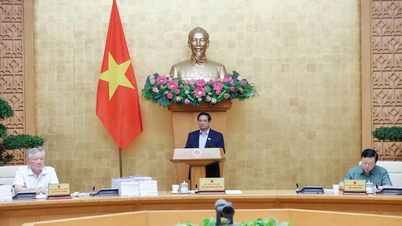This proposal is made in the international experience reference document attached to the draft revised Law on Cadres and Civil Servants.
According to the Ministry of Home Affairs, paying salaries in this way will help civil servants feel secure in their work, reduce negativity and corruption, and limit brain drain. Experience from many countries has shown the effectiveness of this method.
This idea has not been specifically mentioned in the current draft law. The draft law only provides general provisions on the salaries and bonuses of civil servants according to their job positions and in accordance with the socio-economic conditions of the country. When changing positions, salaries and related regimes will also be adjusted according to the new position.
The draft law also stipulates allowances and incentives for officials and civil servants working in difficult areas, on the border, on islands, or in hazardous and dangerous industries, as well as overtime, night work, business trip allowances and other regimes. Details on salary, bonuses and related regimes will be stipulated by the Government.
Currently, the basic salary of Vietnamese civil servants is calculated by multiplying the basic salary (VND 2.34 million from July 2024). According to this calculation, the lowest salary of civil servants is VND 3.1 million/month and the highest is VND 23.4 million/month (excluding allowances).
Civil servants working at the one-stop department, Da Nang City Administrative Center, March 2025. Photo: Nguyen Dong
In a document referring to international experience, the Ministry of Home Affairs said that many countries build a salary structure for civil servants including salary, bonus, travel allowance, residence, and region. Civil servant salaries are often calculated based on the average level of society and the private sector.
In China, in addition to salary, civil servants receive regional allowances, allowances for disadvantaged areas, remote areas, position allowances, housing allowances, and medical allowances. Civil servants who complete their tasks excellently and with competence will be rewarded at the end of the year.
In Japan, the National Personnel Council studies and develops a salary and bonus plan in accordance with job classification. Depending on the level of economic development, civil servant salaries and bonuses may increase or decrease. The Council will submit to the Parliament and the Cabinet the salary increase standards, seniority, difficulty, complexity, and efficiency in work; job classification; remuneration for overtime, night work, and holidays; allowances for work in special fields, for hazardous work; and criteria for adjusting salary and bonus levels.
The salary structure of Japanese civil servants includes the cost of living, the common salary in the private sector and other suitable conditions. From there, the National Personnel Council builds the salary scale, grades and levels for each type of job position.
Thailand stipulates a salary structure including salary, allowances, pensions, and bonuses each year or upon retirement or termination of employment. Civil servants with ethics, discipline, effective performance of public duties, and good results will be considered for salary increases.
The United States pays civil servants based on performance and incentives. Pay increases are based on performance rather than seniority. Civil servants are paid equally for jobs of equal value, taking into account national, local, and private sector pay levels.
In New Zealand, civil servants have an average income of at least 1,333 NZD/year (20 million VND/month) and at most 4,191 NZD (63 million VND/month). This salary includes benefits such as housing and transportation. Civil servants' salaries here are calculated based on their level of work experience and education.
The draft revised Law on Civil Servants and Public Employees is expected to be submitted to the National Assembly at its 9th session opening in May.
Source vnexpress
Source: https://baotayninh.vn/bo-noi-vu-muon-tra-luong-cong-chuc-theo-binh-quan-khu-vuc-tu-nhan-a188745.html



![[Photo] Magical moment of double five-colored clouds on Ba Den mountain on the day of the Buddha's relic procession](https://vphoto.vietnam.vn/thumb/1200x675/vietnam/resource/IMAGE/2025/5/9/7a710556965c413397f9e38ac9708d2f)























![[Photo] General Secretary To Lam begins official visit to Russia and attends the 80th Anniversary of Victory over Fascism](https://vphoto.vietnam.vn/thumb/1200x675/vietnam/resource/IMAGE/2025/5/8/5d2566d7f67d4a1e9b88bc677831ec9d)

































































Comment (0)